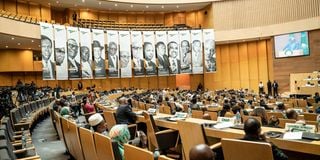Premium
What roles does the AUC chairperson perform?

A banner showing the founders of the OAU, now the African Union, during the 60th anniversary on May 25, 2023.
The African Union Commission chairperson is the topmost official of the continental bloc.
Often confused with the African Union chairperson (an annual, ceremonial rotational post between heads of state and governments), the Commission chairperson is like the chief executive officer of the AU Secretariat, elected every four years, and their mandate renewable once.
Under the old Organisation of African Unity (OAU), this position used to be called secretary-general, even though it had weaker powers then.
Since 2002 when the African Union inherited, and appended the roles of the OAU, we see more of the Commission chairperson, speaking, condemning, criticising or praising.
Still, this is a full-time diplomatic job with a basic monthly salary of $15,576.75, $250 monthly allowance per eligible child, 100 percent school fee payment for every eligible child of the official in Africa or up to $15,000 per year if the station is in Europe or North America and $6,000 in rental budget. Their speeches, though, must be tailored and actions measured in every step they take.
The holder has overall responsibility for the Commission’s administration and finances. He/she is also supposed to promote and popularise the AU's objectives and enhance its performance.
Most importantly, he/she is supposed to consult and coordinate with key stakeholders like Member States, Development Partners, and regional economic blocs.
The roles include facilitating the functioning, decision-making and reporting of all AU organ meetings, and ensuring conformity and harmony with agreed AU policies, strategies, programmes and projects.
Preparing with the permanent representatives from AU Member States (PRC) the AU budget and strategic planning documents; acting as a depository for all AU and OAU treaties and legal instruments, appointing and managing Commission staff and chairing all Commission meetings and deliberations.
The other duties are preparing the annual report on the AU and its organs’ activities, and submitting reports requested by the Assembly, Executive Council, Permanent Representatives Committee (PRC), committees and any other organs.
Since 2002, there have been five Commission chairpersons. Moussa Faki Mahamat is the first to hold the position for two consecutive terms since 2017. His term ends this year. Previous chairpersons are; South Africa’s Nkosazana Dlamini Zuma (2012–17), Jean Ping of Gabon (2008–12) and Alpha Oumar Konaré of Mali (2003–08). Amara Essy of Côte d’Ivoire led the transition team between AOU and AU 2002–03. All these were younger than 70 when they took office.
Commission chairpersons are elected by secret ballot as opposed to the Assembly chairperson often chosen by consensus. The Commission chairperson must garner two-thirds majority of the present voting members. Currently, Sudan, Mali, Niger, Guinea and Burkina Faso are suspended for committing coups.
Since 2021, the AU expanded its Commission to include eight members; the chairperson, deputy chairperson and six commissioners.
Candidates for the office of the chairperson and his/her deputy are often circulated to Member States at least three months before the election.
[email protected]





